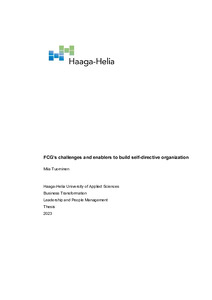FCG’s challenges and enablers to build self-directive organization
Tuominen, Miia (2023)
Julkaisun pysyvä osoite on
https://urn.fi/URN:NBN:fi:amk-2023052313234
https://urn.fi/URN:NBN:fi:amk-2023052313234
Tiivistelmä
This master’s thesis was done as part of Master of Business Administration studies in Haaga-Helia University of Applied Sciences. The commissioning company for this thesis is FCG Finnish Consulting Group Oy which is a Finnish consulting company with history for more than 70 years in Finland.
The objective of this thesis was to find out how employees in FCG understood the concept of self-directive organization. With research questions the goal was to find structures which are enabling or hindering the self-directiveness in FCG.
Research followed Case Study approach. Both qualitative and quantitative research methods were used to gain more thorough understanding of the current situation. The empirical research data was collected through semi-structured interviews and survey. Data analysis brought understanding how different employee groups in FCG understand self-directiveness and what structures employees experienced hindering or enabling self-directiveness in FCG. Development suggestions for FCG senior executives were made based on research results. Implementation plan for development suggestions was excluded from this thesis.
Main findings in FCG supported the results from earlier studies made by other researchers in other organizations or communities. Self-directive organization is a complex phenomenon and is commonly understood differently if it is not defined. Results show that there are structures in FCG which are enabling self-directiveness such as feeling of individual autonomy and possibility to have freedom and independency on scheduling own work. Employee experiences also highlighted trust among employees and managers.
Research results also provided insights to some challenges which should be addressed if FCG would aim on increasing self-directiveness. FCG should eliminate behaviour which is counterproductive for the team autonomy and FCG should define what is the desired company culture and way of work which would lead to better self-directiveness in teams.
Recommendations to FCG Senior Executives were made according to Martela’s four theses of self-directiveness. Recommendation’s themes titles are 1. Define self-directiveness in FCG, 2. Clarity for individual – rights and responsibilities, 3. Power sharing in FCG, and 4. Structures in FCG.
The objective of this thesis was to find out how employees in FCG understood the concept of self-directive organization. With research questions the goal was to find structures which are enabling or hindering the self-directiveness in FCG.
Research followed Case Study approach. Both qualitative and quantitative research methods were used to gain more thorough understanding of the current situation. The empirical research data was collected through semi-structured interviews and survey. Data analysis brought understanding how different employee groups in FCG understand self-directiveness and what structures employees experienced hindering or enabling self-directiveness in FCG. Development suggestions for FCG senior executives were made based on research results. Implementation plan for development suggestions was excluded from this thesis.
Main findings in FCG supported the results from earlier studies made by other researchers in other organizations or communities. Self-directive organization is a complex phenomenon and is commonly understood differently if it is not defined. Results show that there are structures in FCG which are enabling self-directiveness such as feeling of individual autonomy and possibility to have freedom and independency on scheduling own work. Employee experiences also highlighted trust among employees and managers.
Research results also provided insights to some challenges which should be addressed if FCG would aim on increasing self-directiveness. FCG should eliminate behaviour which is counterproductive for the team autonomy and FCG should define what is the desired company culture and way of work which would lead to better self-directiveness in teams.
Recommendations to FCG Senior Executives were made according to Martela’s four theses of self-directiveness. Recommendation’s themes titles are 1. Define self-directiveness in FCG, 2. Clarity for individual – rights and responsibilities, 3. Power sharing in FCG, and 4. Structures in FCG.
